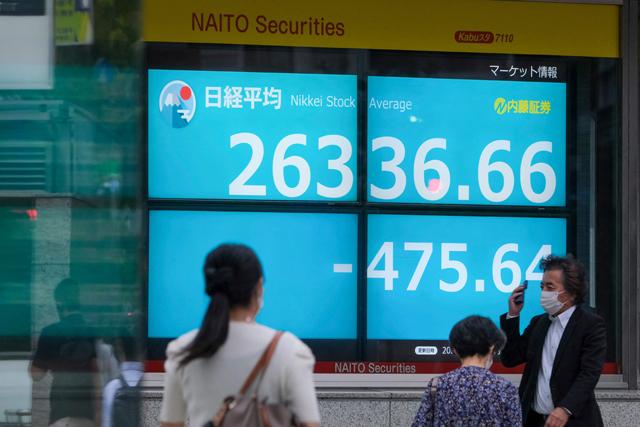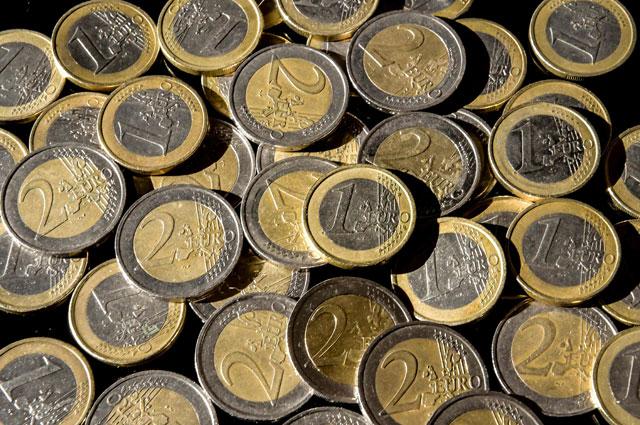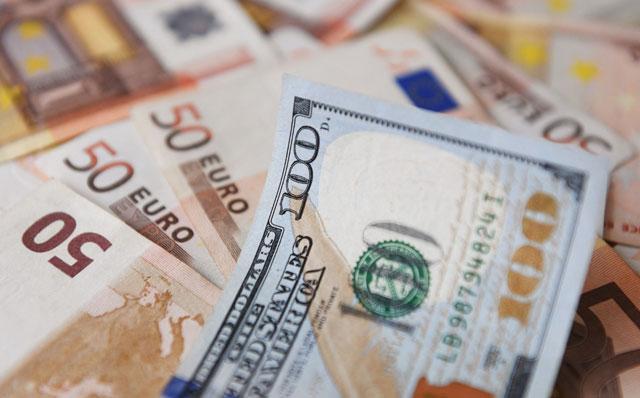You are here
Stocks fall, euro nears dollar parity as recession fears build
By AFP - Jul 12,2022 - Last updated at Jul 12,2022

Pedestrians walk past an electronic share price board showing the closing numbers on the Tokyo Stock Exchange in Tokyo, on Tuesday (AFP photo)
HONG KONG — Equities fell on Tuesday, along with oil, on fears that central bank moves to fight inflation will spark a recession, while the euro fell towards parity with the dollar as cost-of-living crises loom over the eurozone economy.
Worries about a COVID flare-up in China — fuelling fears of more lockdowns — added to the downbeat mood, just as investors prepare for a week of data and earnings that could have huge implications for markets.
Wall Street ended with more losses, with tech firms taking the brunt of the selling on expectations for an extended period of hefty interest rate hikes — the sector is particularly susceptible to higher borrowing costs.
A forecast-beating US jobs report last week suggested the world's top economy was coping with higher Federal Reserve (Fed) rates, but it also gave the bank more room to continue lifting — leading to concerns it could go too far and cause a contraction.
"While the jobs report on Friday highlighted that the US is faring better than the rest in the race to avoid a recession, the rest of the world is sinking under the weight of a cost-of-living crisis and higher interest rates," said OANDA's Craig Erlam.
He added that a recent bounce in stocks had faded "and we now head into earnings season and another week of major economic reports fearful of what may lie ahead".
Tokyo, Shanghai, Hong Kong, Seoul, Singapore, Wellington, Mumbai and Taipei all fell, though Sydney and Jakarta edged up.
London, Paris and Frankfurt were also down at the open.
Bets on a drop in demand caused by a possible recession also hit the crude market, with both main contracts extending Monday's losses.
Euro nears dollar parity
The Fed's sharp rate hikes have sent the dollar soaring, with the euro particularly under pressure as the European Central Bank moves more slowly in tightening monetary policy and the region faces an energy crisis caused by the Ukraine war.
Sanctions on oil imports from Russia and Moscow's warnings that it will shut off gas to Europe have led analysts to predict the eurozone will fall into recession, and pushed the euro to a 20-year low and close to parity with the greenback.
But commentators said that even if the European Central Bank lifted rates more quickly, that would add to the economic pain.
While the single currency picked up slightly after hitting a low of $1.0003, there is a broad expectation that it is a matter of time before the $1.0000 level is breached.
There is a fear that a planned 10-day shutdown of Russia's key Nord Stream 1 gas pipeline for maintenance could be extended by Moscow in retaliation for European sanctions linked to its invasion of Ukraine.
French Economy and Finance Minister Bruno Le Maire warned over the weekend that there is a strong chance Moscow will turn off the taps in the winter.
"The next few weeks could be challenging for Europe, with possibly maximum uncertainty stretching into August," said SPI Asset Management's Stephen Innes.
"Investors increasingly believe that gas may not start to flow through Nord Stream 1 again following the scheduled maintenance on July 11-21, with further 'temporary' interruptions seen as likely."
Investors are also awaiting the upcoming corporate reporting season with the dollar in mind.
The currency's strength will not only "affect this quarter's earnings, but more likely it's going to affect the revenue generation outlook for the next couple of quarters and that, I think, is a big problem", Kimberly Forrest, of Bokeh Capital Partners, told Bloomberg Radio.
Markets strategist Louis Navellier added: "Earnings will be very revealing, the outlook for the second half [of the year] more so, as far as the state of consumer demand and the impact of inflationary pressures on profit margins and revenue growth."
"There is already early downward pressure with 71 S&P companies having already issued negative guidance versus outlook given in the first quarter earnings," the highest since the final three months of 2019.
Related Articles
LONDON — The euro dived to a new two-decade low against the dollar and European stock markets fell on Tuesday as weak economic data raised f
HONG KONG — Asian stocks were mixed on Wednesday as traders struggled to recover some of the losses suffered at the start of the week, while
LONDON — European equities sank on Thursday on fears that rising interest rates will spark a global recession, while the pound clawed back g













